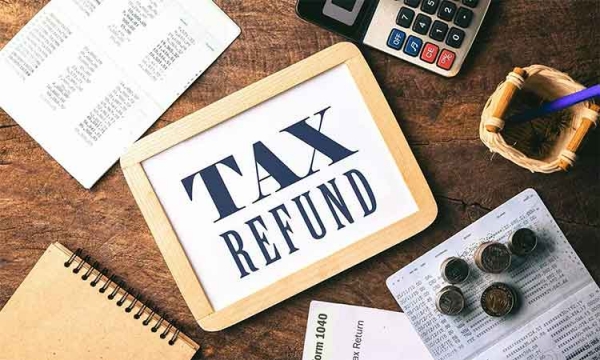How to track your income tax refund status online - Business2Business
How can I track the status of my income tax refund? Once you file an ITR and claim your tax refund, you can check the status of your refund online at www.incom
- by B2B Desk 2020-11-05 07:17:06
According to the income tax rules, the tax must be deducted from the sources of income at the rates by the payer. Sources of income can be salaries, interest, commissions, rent, brokerage, professional fees, royalty, and others. Therefore, in the case of salary, the rate of tax deducted at source (TDS) must be in line with the income tax slab applicable to the individual.
Once TDS is deducted, the same amount must be transferred to the central government account within a specified period of time. Often, however, income recipients do not provide the proper statement of expenses and investments that could reduce your taxable income. As a result, excess TDS is deducted. Such additional tax paid can be claimed as refunds, but only if you file your tax return. If you do not submit your ITR, you cannot claim a tax refund.
Do I earn any interest on the income tax refund due?
When the amount of the income tax refund exceeds 10 percent of the total income tax paid, the government pays interest on the amount owed under Section 244A of the Income Tax Act of 1961. Under this section, interest at the rate of 0.5 percent a month has to be paid on the refund amount, starting from the first day of the assessment year until the date of the grant of refund.

How can I track the status of my income tax refund?
Once you file an ITR and claim your tax refund, you can check the status of your refund online at www.incometaxindia.gov.in or www.tin-nsdl.com. Log in to either of these two sites and click on the "Tax Refund Status" tab, enter your Personal Account Number (PAN), and the Assessment Year (AY) for which your refund has been suspended.
If the department has already processed the refund, you will receive a message indicating the payment method, reference number, status, and date of the refund. If the refund was not processed or declined, the message will show it.
What are the possible reasons for the delay in getting a tax refund?
There may be several reasons for delaying or denying a refund of income tax by the Tax Administration. Typically, the most common reason behind delays is incorrect bank account details that the testers entered on the ITR form. When submitting an ITR, bank details, including bank name, account number, and 11-digit bank IFS code or International Bank Account Number (IBAN) details in case you have a foreign bank account, they must be indicated correctly.
Also, be sure to check the correctness of the specified bank account for an advance refund with the electronic deposit account and also link it to your PAN.
Another common reason for a delay or not getting a refund is that there is a mistake in calculating the refund.
Can I rectify the mistakes before placing a request for the re-issue of income tax refunds?
Don't worry if the status report makes you realize that you made a mistake with your bank account details when filing an ITR, as it will allow you to make corrections in such cases. To do this, log into the e-filing portal (www.incometaxindiaefiling.gov.in), go to “My Account” and then click “Request a Refund Reissue”. Follow the steps and enter the correct details of the bank account where you want your income taxes recovered, and submit the request. If your details are correctly filled in on the ITR, you can expect to receive your refund within a few days.
Source: MoneyControl
Also Read: Sukanya Samriddhi Yojana or equity mutual funds: Which is better option?
POPULAR POSTS
Loan EMIs to Drop as RBI Slashes Repo Rate - Full MPC December 2025 Highlights
by Shan, 2025-12-05 11:49:44
Zoho Mail vs Gmail (2025): Which Email Platform Is Best for Businesses, Startups, and Students?
by Shan, 2025-10-09 12:17:26
PM Modi Launches GST Bachat Utsav: Lower Taxes, More Savings for Every Indian Household
by Shan, 2025-09-24 12:20:59
$100K H-1B Visa Fee Explained: Trump’s New Rule, Clarifications & Impact on Indian Tech Workers
by Shan, 2025-09-22 10:11:03
India-US Trade Deal Soon? Chief US Negotiator Arrives in Delhi as Talks Set to Begin Tomorrow
by Shan, 2025-09-15 11:54:28
Modi Meets Xi: Trump’s Tariffs, Strategic Autonomy, and the Future of Asia’s Power Balance
by Shan, 2025-09-03 06:40:06
Google Claims Gemini AI Uses Just ‘Five Drops of Water’ Per Prompt, Sparks Debate
by Shan, 2025-08-22 12:34:27
RECENTLY PUBLISHED

Pine Labs IPO 2025: Listing Date, Grey Market Premium, and Expert Outlook
- by Shan, 2025-11-05 09:57:07

The Agentic Revolution: Why Salesforce Is Betting Its Future on AI Agents
- by Shan, 2025-11-05 10:29:23

Top 10 Insurance Companies in India 2026: Life, Health, and General Insurance Leaders Explained
- by Shan, 2025-10-30 10:06:42

OpenAI Offers ChatGPT Go Free in India: What’s Behind This Big AI Giveaway?
- by Shan, 2025-10-28 12:19:11

Best Silver Investment Platforms for 2025: From CFDs to Digital Vaults Explained
- by Shan, 2025-10-23 12:22:46





 Subscribe now
Subscribe now 